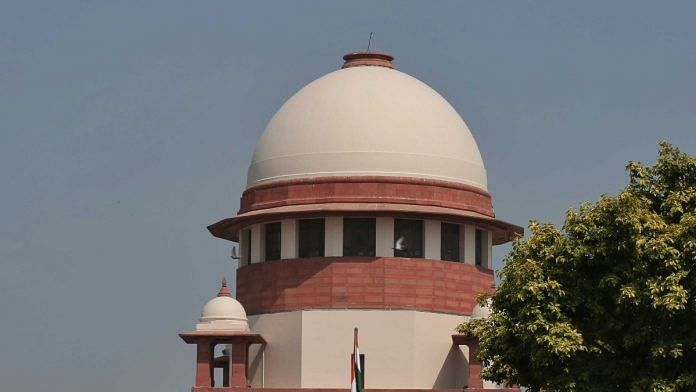New Delhi: The Supreme Court is yet to respond to an August 2021 communiqué from the Union government asking it to draw up a formal process for appointing retired judges to high courts, ThePrint has learnt.
The law ministry’s letter came four months after a judgment by the top court suggested such appointments on an ad-hoc basis to tackle the backlog of cases, in particular those that have been pending for more than five years.
In the letter, the ministry had raised concerns about the absence of a mechanism in the Memorandum of Procedure (MoP) to make these appointments, official government sources told ThePrint.
The MoP is a set of guidelines for the appointment of judges in the higher judiciary. The government has asked the top court to supplement the existing MoP.
According to sources, the government also has reservations over the court’s suggestion that background checks should be waived for retired high court judges appointed on an ad-hoc basis.
Delivered by a bench headed by the then chief justice of India (CJI) S.A. Bobde and comprising justices S.K. Kaul and Surya Kant, the 2021 judgement paved the way for making such appointments under Article 224A of the Constitution. The bench enumerated the circumstances under which ad-hoc appointments could be made.
The judgment came on a petition filed by a Lucknow-based NGO, Lok Prahari, on rising judicial vacancies in high courts. The suggestion to have ad-hoc judges was made to overcome the vacancies, which have been a bone of contention between the Union government and the Supreme Court.
While the top court has frequently blamed the government for delaying appointments, despite clearances from the highest appointment body — the Supreme Court Collegium — the government has claimed that the high courts don’t forward recommendations on time.
Sources in the law ministry told ThePrint that 50 per cent of existing vacancies in HCs are down to the judiciary not sending its recommendations.
Over the past month, the Union government has also increasingly questioned what it says the collegium system followed to appoint judges, which it calls “opaque”.
Also Read: ‘Keeping names on hold not acceptable’ — SC questions Centre on delay in judicial appointments
Waive background checks, says SC, but govt ‘reluctant’
In its 2021 judgment, the Supreme Court referred to paragraph 24 of the MoP, adding that it contained the procedure for such appointments. The bench also sought to waive background checks on such candidates since they had already served as high court judges.
But in its letter, the ministry has argued that in case there’s a gap between a judge’s retirement and his or her re-appointment, there should be a background check. This, the sources said, was necessary so that no questions are raised about the appointment after it is made.
The letter also asks the Supreme Court to develop a system to review the performance of an ad-hoc judge. Although this isn’t done for regular HC judges, the government thinks it should be done for ad-hoc ones because their appointment would be for a specific purpose — to tackle the backlog of cases.
The third point highlighted in the letter concerns the removal of an ad-hoc judge, sources said.
The Constitution provides that a sitting judge can be removed only by an order of the President based on a motion passed by both Houses of Parliament — a process colloquially called impeachment.
The procedure for the removal of judges is elaborated in the Judges (Inquiry) Act, 1968.
The letter has asked if a similar procedure should be followed for an ad-hoc judge if their work is not satisfactory or there are allegations of misbehaviour or incapacity — the two grounds on which a sitting HC judge can be impeached.
The April 2021 judgement had said that keeping ad-hoc judges wouldn’t constrain or limit the regular appointment process, adding that it would be a “transitory methodology till all the appointments are in place”.
While the ministry is yet to receive a response from the Supreme Court, the latter has taken up the issue of the appointment of ad-hoc judges again on the judicial side.
In September this year, the court sought a status report from the Union regarding any recommendation being made for ad-hoc judges.
It also pondered on whether to relax one of the conditions set out in the April 2021 verdict — that there should be more than 20 per cent vacancy in a high court to trigger the process of appointing ad-hoc judges. The bench was of the view that some HCs have a large number of vacancies and are also being troubled with a backlog of cases in specific subjects.
Atthough the case was taken up Wednesday, it could not proceed due to the unavailability of the attorney general. It is expected to be heard Thursday.
(Edited by Uttara Ramaswamy)
Also Read: ‘System is deprived of talent’ — Ex-CJI UU Lalit admits delay in appointment of judges



